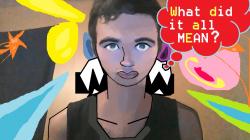Finale
Folder:
Tennessee Myth It is said in certain places
That the soft, downy fur
At the base of a deer's antlers
(Like brown moss
On Birchwood bones
The black eyes draw your focus first
Wet with prey-fear and dawn dew
But the antlers hold your gaze)
Yes of the fur it is said
That it contains healing properties
Medicine is made of it
Wounds, sometimes inflicted by the beast,
Are sealed with it
How curious it is,
This conflict of being.
Each disparate element is intrinsic to the thing;
Spears made of bone
Medicine made of fur
A contradiction in the flesh
I have two wolves inside of me
They are fighting for a meal
But who among us is not like that?
Made to harm,
made to heal.

Prey-fear and dawn dew?
Prey-fear and dawn dew? Really? From four such simple and ordinary words, juxtaposed by the poem's process, you present a highly emotional, profoundly complex, thought which far transcends the ordinary simplicity of the words as we normally use them. To me, this is a textbook perfect example of the highest function of Poetry: to draw from our ordinary words concepts that far exceed the sum of those words. Poetry, when written by a real Poet and not a mere poseur, is like a star---fusing all sorts of elements from the simplicity of hydrogen, and providing to us the by-products of light and warmth. You are writing real Poetry . . . as if you had invented the concept and form.
Starward*Led